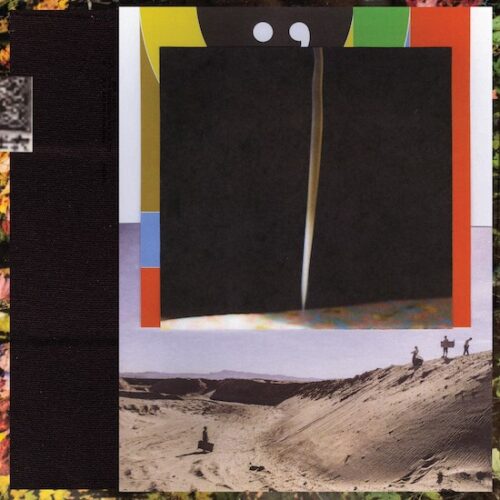“It might be over soon.” Those words, inaugurating 22, A Million – Justin Vernon’s last album as Bon Iver – seemed at the time somehow too pregnant, prophesying something as yet unseen. It’s hard not to return to them upon the release of Bon Iver’s fourth album, i,i, for here indeed something seems to be drawing to a close.
There is something desperately sad about the sound of an important artist losing their footing. Ostensibly much is the same, all the familiar pieces are in place, and yet something fundamental is missing; an animating force reorientating and reordering individual elements to articulate them as more than the sum of their parts. Without it there remains a magician with cards hanging out of their sleeve; an uncanny valley whereby something beloved is laid bare, cast in an unflattering, absurd new light.
The French filmmaker Jean-Marie Straub talked of the importance of something that burned within a shot and, similarly, each of Bon Iver’s previous three releases – 2006’s For Emma, Forever Ago, 2011’s self titled and 2016’s 22, A Million – have burned with the rare luminosity of a Damascene epiphany. Even Vernon’s features (a generous collaborator, his contributions have recently lit up tracks by James Blake, Vince Staples, Bruce Hornsby and Chance the Rapper alongside beatific recent work with Big Red Machine) have a rarefied sense of warmth.
Press around the time of 22, A Million elaborated upon the sense of precarity in the album’s first five words: with Vernon reportedly struggling to find the music, considering shelving the Bon Iver project for good, the album almost didn’t materialise at all. Such reports helped illuminate an album whose music felt unbearably hard-won; the sound of blood from a stone; a sense Vernon had searched through endless Sisyphean iterations to arrive, almost impossibly, at something consecrated.
By comparison, nothing burns in i,i; it simply comes too easy. By all accounts Vernon navigated 22, A Million’s sense of crisis to arrive at a much better place personally and – whilst it is undoubtedly perverse to perpetuate the tired, destructive myth of bad times leading to good music – it’s also impossible to listen to i,i without the feeling a fundamental tension is missing. All the familiar staples are there – Vernon’s soulful falsetto and sharp ear for pop phrasing, hiply obscure lyrics (which, more than ever, I’m convinced are written à la Tom Waits: sound and melody first, words and significance later), dense knots of saxophones, atomised drums, helium-inflated vocal samples, Copland-esque vistas of strings and wind, and that trademark Bon Iver brand of emotional catharsis. Whatever electric charge previously animated these elements to give them such resplendent body and consciousness, however, is absent.
The recipe is largely the same, and perhaps therein lies part of the problem, for there is little here that significantly departs from previous Bon Iver expeditions, to the extent that i,i overall seems defined by the sense of a narrative abandoned, of history relinquished.
It is all very pleasing to the ear and there is much to enjoy on a superficial level. The torchsong balladry of ‘Hey Ma’ or ‘Faith’ follow on almost directly in both feel and arrangement from 22, A Million’s ’33 “GOD”’ and ‘8 (circle)’. The production is immaculate, and headphones open up layer upon layer of lovingly-rendered detail in the album’s pockets and linings.
A roster of indie royalty – Moses Sumney, Jen Wasner, James Blake, Aaron and Bryce Dessner, Bruce Hornsby –add communal warmth and clutter to the album’s packed tracklisting. Many of the tracks are short and featherweight, recalling in part the deft sketches of Frank Ocean’s Blonde whereby songs evaporate rather than finish.
Vernon’s voice is significantly less processed than on 22, A Million, although the results (such as ceiling-scraping squawks of ‘Holyfield’ or the constipated barks of ‘Naeem’) are not always flattering. Overall i,i sounds expensive and yet – simultaneously – all too safe.
Comfort verges on complacency: in the crumbly drums of 22, A Million’s ’10 d E A T h b RE as T’ or the wonky sonics of ’29 #Strafford Apts’ there was the live spark and crackle of risk. Here, even within the more experimental stylings of ‘Holyfields’ or ‘Jelmore’, everything is too familiar, too glibly hip and – frankly – far too self-satisfied.
Vernon recently evangelised that “I’m doing this to show you about you, or us about us” and truly, all i,i demonstrates to me in this respect, is – once again – the failure of comfortable liberalism within late Western capitalism.
Bon Iver isn’t the only one of the indie generation of the noughties who now seems to be losing their grasp. A slow wane of historical purchase also seems evident in the broader critical decline of US indie monolith Pitchfork Media (now four years absorbed into Condé Nast and experiencing a slow exodus of many of the writers who helped establish its bite) who immediately canonised i,i upon its appearance on streaming platforms earlier this month; and – along with them – many of the bands whose careers Pitchfork has helped launch, no more evident than in Arcade Fire’s endless trudge of ever more meaningless music played to ever bigger stadiums.
A friend of mine recently spoke about the ironies of being approached at merch tables by fanboys (always the boys), alternatively ecstatic in their devotion or furious with him for besmirching something they felt was as much theirs as his. Perhaps, in fairness, that is all this is. Chalk it up to a personal taste for modernism that i,i leaves unsatisfied. And yet: in it’s unwillingness to step forwards into the unknown, to submerge itself again within that dialectical madness of possibility in search of something that truly burns, i,i loses the sanctity that has characterised every other Bon Iver release to date. For now, it would seem, history lies elsewhere.



